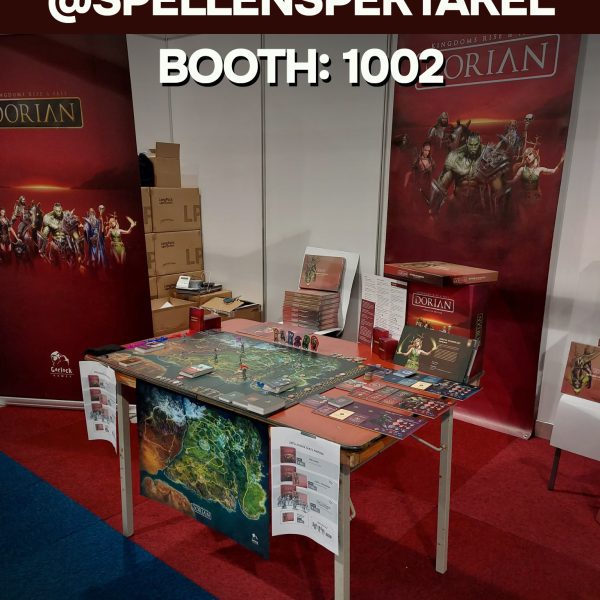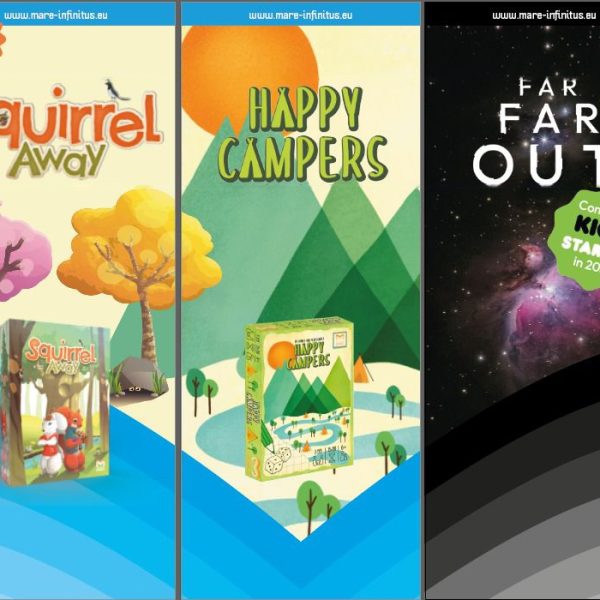How do you start if you want to create a new board or mobile game? Well that’s easy. You start with an idea, right? But what is an idea exactly, and the better question is: what is a good idea? With the board game “Dorian – Kingdoms Rise and Fall” we are in our final stages of game development, but I noticed that a lot of people who want to create something, struggle with the question about how they can come up with a good idea.
As an experienced game designer, this is not the first game I have created. I have helped to create multiple online games, including the massively popular mobile game Online Soccer Manager. Dorian is my first board game. But for all games the initial question is the same: how do you come up with a compelling idea to start your game? I would like to share my thoughts and insights about having game ideas, and how to explore them further.
#1 – Set your goals
To be able to assess your idea, you first need to know what you want to achieve. For example, if you want to achieve world domination in a mass market, a new game about Dutch speed skating is probably not the best idea. Speed skating has a very specific, small target group.
Always start by thinking about your goal and primary target market. Set your targets clearly, so you’ll know what you are striving for. With a good idea, you must be able to achieve what you initially had in mind. That belief will help you execute on your idea and will protect you against expectations that are too high.
Of course you will also have to take into account what kind of resources you have like craftsmanship, technical knowledge, time frame, budget etc… But be careful not to raise all these barriers during a brainstorm, it can kill any creativity or chemistry in the brainstorm session. Use these boundaries later on, when you start selecting the best game ideas or set these boundaries clearly at the start of the brainstorm.
#2 – Deconstruct your idea
When you are brainstorming about ideas for a new game, be it a video game or a board game, you will often try to imagine the game being filled with cool art and a lot of game elements. But that should not be the part that makes your game fun! Try to stay with the essence of your idea and define your core gameplay or core game loop. Maybe this sounds obvious, but this principle can be carried even further than you might think.
Let me give you an example: when you think about a racing game, where you are racing against other players, you might think the core gameplay is: racing. But try to deconstruct this concept even further and think about what the player is actually doing or thinking. In this case it is ’tapping’ and ‘reacting to other players’, or maybe ’timing’ and ‘getting skilled in avoiding obstacles’. And if you look it that way, you could also make the same game with racing boats, a skiing competition or a rabbit running away from a fire avoiding falling branches. Because all these concepts have similar gameplay if you look at it from the core game-perspective.
#3 – An idea = an assumption
To start off with an important quote I heard: “the best way to get the best idea is to have lots of them!” So you’ll start to brainstorm and the pile of ideas starts to rise. But it is important to ask yourself this question with each idea: what is the essence of my idea and why am I so psyched about it? Is it, because of the theme, e.g. racing game? Is it because it has unique gameplay, e.g. tapping and avoiding obstacles? Or is it the combination of the two, that makes your idea so awesome?
Therefore my definition of a game idea is:
“A game idea is an assumption of why the game will be a success fun”
The more convincing the assumption sounds or feels, the better your idea is. Don’t forget to involve other people to validate this. Pitch your idea multiple times to different people.
Let me give you some examples of deconstructed ideas (I would not call them good ideas):
- Assumption: we need to make a skiing game because skiing is getting more and more popular – Market
- Assumption: we have to make a strategic game for AR, I think the technology is very suitable for that and there is room for this genre – Technology & market
- Assumption: build a progression loop around a bunch of hyper casual games – Game mechanic
- Assumption: there is great need for another word puzzle game in the market – Genre / user need
- Assumption: playing a game with Harry Potter IP will be successful – Intellectual Property (IP) usage
Most of the time, when you have an idea, you can divide it into a few of these assumptions.
Ok, I deconstructed my idea, what’s next?
When you know exactly what it is that makes your idea tick, then you can think about the best solution for all the elements of your game, such as theme, mechanics, IP, market etc. And if possible, you can separately test your ideas/assumptions, through playtests and user research.
Dorian – Kingdoms Rise and Fall was previously called Nexular and was set in a cyberpunk theme. But the theme is not what makes our game special; it is the battle mechanic and the economy system. Therefore, we could easily change the theme, to make sure it perfectly fits the mechanics.
Finally, I would like to end with some advice; a lot of people believe that the initial idea is the most important thing of all and a game with a good idea can’t fail. But believe me, eventually the execution really makes all the difference!



